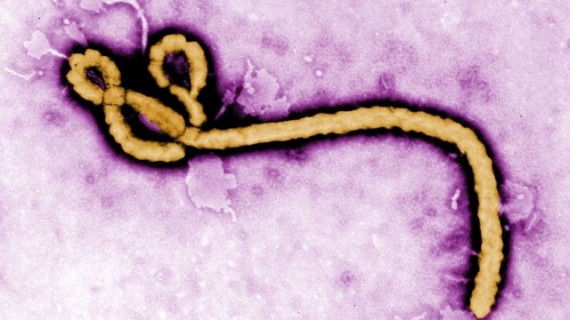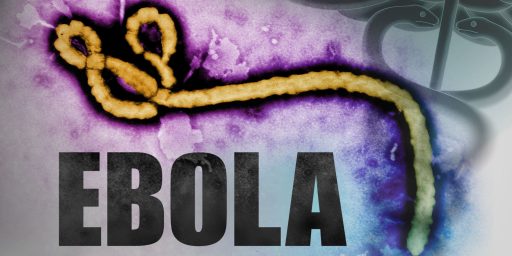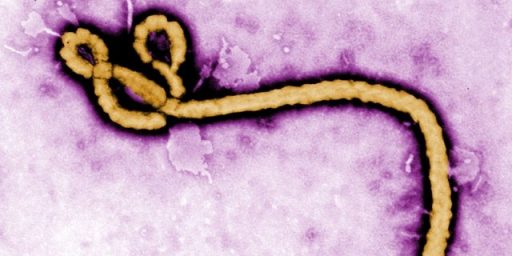Texas Health Worker Tests Positive For Ebola, But That’s No Reason To Panic
A second case, and the first person to apparently contract Ebola on U.S. soil. But, that's no reason to panic.
A health care worker who was involved in the treatment of Thomas Eric Duncan, the first Ebola patient to die in the United States, has tested positive for the virus:
DALLAS — A health care worker here who helped treat the Liberian man who died last week of the Ebola virus has tested positive for the disease in a preliminary test, state health officials said Sunday.
Dr. Daniel Varga, chief clinical officer of Texas Health Resources, which oversees Texas Health Presbyterian Hospital in Dallas, told reporters on Sunday that the worker came into contact with Mr. Duncan during his second visit to the emergency room. The person was wearing protective gear when he or she came into contact with Mr. Duncan, although Dr. Varga did not elaborate on the type of contact or the type of job the person has at the hospital.
“This individual was following full C.D.C. precautions,” Dr. Varga said, adding, “Gown, glove, mask and shield.”
Asked how concerned he was that even after those precautions the worker tested positive, Dr. Varga replied, “We’re very concerned.”
Dr. David Lakey, the Texas health commissioner, said: “We knew a second case could be a reality, and we’ve been preparing for this possibility. We are broadening our team in Dallas and working with extreme diligence to prevent further spread.”
The worker, who was not identified, was an employee of Texas Health Presbyterian Hospital in Dallas, where the first person diagnosed with Ebola in the United States, Thomas E. Duncan, died last week.
The health care worker reported a low gradefever Friday night and was isolated and referred for testing. Officials interviewed the worker and were identifying “any contacts or potential exposures,” the statement read.
The preliminary test was done at the state public-health laboratory in Austin and the positive result was received late Saturday, officials said. Other tests will be done by the federal Centers for Disease Control and Prevention in Atlanta.
Obviously, the fact that a health care worker who was reportedly following the required isolation protocols testing positive for the virus is concerning. The most logical conclusion, though, is that there was some failure in following the protocol that, as yet, is not being reported. This could be due to a failure in the protective gear of some kind, or to something as simple as not taking proper care when removing the protective gear, which is apparently the manner in which a health care worker in Spain who was diagnosed last week contracted the disease. In any case, in addition to treating this person there will clearly need to be an investigation in to how they may have contracted the disease, assuming the diagnosis is confirmed by the C.D.C. Sadly, though, it’s worth noting that health care workers who come in contact with Ebola patients have shown a tendency to come down with the disease. That’s how both of the American doctors who were treated, and successfully cured, at Emory University last month were infected. While it’s still not clear exactly how those two workers were infected, once again the obvious and logical conclusion is that there was some failure to follow isolation protocols, even something very minor, that allowed the virus to slip through.
In the meantime, it’s worth noting that none of the people who came in contact with Mr. Duncan casually have tested positive for the disease to date, including family members who spent time with him alone in the days before he was admitted to the hospital. This health care worker, on the other hand, likely had prolonged direct contact with Duncan during the worst parts of his illness, when he would have been most likely to transmit the disease, and had some kind of contact with the bodily fluids that transmit the disease. While this development is certainly a cause for concern, most especially given the fact that someone who was supposed to have been protected from that contact has apparently contracted the disease, it is still not a cause for panic. We aren’t living in Sierra Leone or Liberia, and there’s no evidence that the virus is “in the wild.” Most likely there is a logical explanation for why this has happened. We need to find out what that reason is, of course, but we should keep our wits about us while doing so.




AAAAAHHHHHGGGGGAHGGGGAAAAAAAAHHGGGGGAAAAAAAAAGGGGGHHHHHHHHHHH!!!
RUN AWAY RUN AWAY RUN AWAY!!!!
If I had to take a guess, one of the most common failures it to wash your hands immediately after removing gloves. I’ve seen it plenty of time, you know you can’t touch your face with gloves on so of course your nose starts itching then when you finally get them off, instead of promptly washing their hands they scratch the itch. The reason for the hand washing is because there may have been microscopic tears in the glove (or even manufacturing imperfections) that aren’t visible but are still big enough to let pathogens through.
We have a couple of greater threats that will kill people. First there in Enterovirus D68 that has already infected 700 people here, killed 6 and left several survivors partially paralyzed. Second there is a rather nasty strain of influenza that has made a sudden appearance and is not included in this years flu shot so could kill hundreds if not thousands. And then of course there are the 25 to 30 thousand people who are killed by fire arms in the US every year.
Well, when someone in the ER in full PPE contracts a deadly contagious disease, it’s pretty damn close to time to panic.. The confidence that we won’t have problems with ebola is rooted in the belief that once a patient is identified, we will be able to treat them without spread, this suggests this confidence might be misplaced. Option A is that the ER worker had a PPE failure (extremely likely), option B is that the disease spreads more readily than believed (unlikely, but not impossible).
@Crusty Dem:
Absent further evidence, there is no reason to believe Option B is the case.
@Doug Mataconis: Agreed, but given that ebola is mildly contagious, it’s a cause for concern.. I mean, if we have a needle stick or obvious failure in facemask or something, no worries – otherwise, uhhh, worries…
Given the lawsuit from the original victim and the lawsuit from their employee, how much loonger will Texas Health Presbyterian Hospital be in existence. The management of the hospital gambled when they kept the patient and now they are going to lose millions and will be lucky to stay in business.
If a hospital cannot follow procedures with a diseases that can kill its staff, does anyone believe they care at all about diseases like VRSA that only kills the patients.
Now is not the time to panic. We should wait a few weeks until the Obama administration has completely bungled this task too, then we can panic.
It is obvious that there needs to be a thorough investigation to track down how this “highly unlikey” event is happening. Then they can take appropriate measures. One thing they could tighten up is the containment facility: it should have double barriers, much like what used to handle radioactive materials.
There are new reports that adfitional measures are now in effect at airports regarding people coming in from other countries. People who have been in the ebola countries will have further tests.
@Tyrell:
The official CDC recommendations are only for a single room with private bath, door closed, PPE for those who enter. Most stringent is a guard to ensure PPE on those who enter. They aren’t doing any fancy “isolation” like they show on TV programs. Truth, this might be enough, except that it means their is no dedicated anteroom to don and doff the protective gear. Either they are doing it in the room or in the public hallway.
The set up might be more makeshift, but they recommend more isolating measures for an African setting.
Who’s panicking, aside from the people who’s narrative is failing?
The fact that your headline has the words “but that’s no reason to panic” is enough reason to panic. Signaling, man!
@Dave:
Yes, why hasn’t the Obama administration done a better job running Texas Presbyterian Hospital in Dalla…uh, hey. Wait a minute.
Can we ban all flights in and out of Texas yet? And build a 30 foot wall around the state?
It’s the only way to be sure this outbreak won’t infect the rest of us.
@Rafer Janders: You need to up your reading comprehension. I specifically said that what has happened at Texas Presbyterian is not a reason to panic. But I do have a high degree of confidence that the Obungler and Co. will somehow/someway eventually screw up this problem too.
If we’re going to go political about this, Dave, I’m am certainly happier with the current President than I would be with the last one or Saint Reagan.
@argon: But I would rather have JFK, Johnson, Carter.
@Doug Mataconis:
But… 100% INCREASE IN EBOLA IN THE US!!!
Even given that the employee didn’t comply with all of the proper protocols, what’s disconcerting is that the plan may require 100% compliance and 100% compliance is pretty difficult to achieve (even when one’s life depends on it, evidently).
@Grewgills: Ebola is the fastest growing disease in the United States, doubling it’s impact in days!
Well, we may have one in Boston now: http://www.boston.com.
more people in the US died on the roads in the today, than will die of ebola in the next decade.
@Ron Beasley: A gun is not contagious. I have a gun, but it cannot fire since the firing pin is gone and they probably no longer make ammunition for a 1917 Polish Mauser. So no one can catch a gun from me. I have never caught gun. I hope that I never will.
@CSK: A lot can happen in four hours.
@Dave: So your President gets the blame for the errors of a local private hospital that is not under central government operational administration, preemptively?
Queer party political rabidness that.
@Tyrell: Or rather than pointless double barriers, simply wash down stations so that the actual likely point of transmission – the health worker touching glove to face – is controlled for.
@JKB:
This is the the real issue for community hospitals (like the one I work at). We just aren’t set up logistically to manage these cases properly. And yet, if there is even a mini-outbreak, we will have to do just that.
As noted in the main post, the logistics of getting out of contaminated PPE is among the most dangerous issues for healthcare workers in westernized countries.